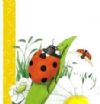|
ESL Forum:
Techniques and methods
in Language Teaching
Games, activities
and teaching ideas
Grammar and
Linguistics
Teaching material
Concerning
worksheets
Concerning
powerpoints
Concerning online
exercises
Make suggestions,
report errors
Ask for help
Message board
|
ESL forum >
Ask for help > new language
new language
|

wizardchildsmile

|
new language
|
|
hi , everybody
first , I want to thank everybody help me befor during my studies
second ,I want to ask a question
which age should the child begin to learn English as a second language?
Is it 4 or 5 years?
I wait 4 ur replies
OK I READ all the replies on my question and i thank all the people who give me the answer , but how learn child in the age 3 and half to write the second language although he cant till now write the alaphet in his mother language and his prounciation is not good in his mother language. i am afraid if i begin to learn him english as a second language affect badly on his acquring his mother language (arabic).i think i should learn him some words and leave the other stages like writing stage till the age 4 or 5 till he can write and read his first language correctly. what do you think? am i right? |
27 Oct 2009
|
|
|
|

ituska

|
within the family (bi-lingual parents) they can start since the birth. But the main rule must be kept - one parent talks ALWAYS only one language
If it is not in family, it is good to start if there are bases of the mother language.
In my group I have kids in age 2-3 and the fastest progress makes the youngest boy :-)
I wouldnt be scared to start at the age of 2
|
27 Oct 2009
|
|
|

lizsantiago

|
|
as an esl teacher and single parent i started to teach my son both languages since birth and he is completly bilingual and he is 9 yrs now. as a teacher i have seen that as soon as a a child start the better. |
28 Oct 2009
|
|
|

SaraMariam

|
|
My experience is the same. The sooner the better. The youngest child I had was 2 years old when she came to me. I taught her for 3 or 4 years and even she was a bit shy at the beginning; later she didn �t stop speaking English at home. I just have good experiences with early childhood ESL |
28 Oct 2009
|
|
|

cherieimh

|
|
I am an American who was married to an East Indian and our daughters were born in India. They started learning both languages as newborns and learned to speak both naturally. We had an ayah who spoke a third language to them and it was natural for them to weave through the languages. Living in India I saw many people who can speak many languages with no confusion at all. I do believe that to keep the pronunciation on target it is always best that the parent uses their own native language. My daughters are lovely University graduates and one now teaches English Lit to High School students at a Thai Chinese school in Bangkok, all of her students are tri-lingual. I cannot imagine �waiting � to start the second language as it might just not ever happen. Good luck!
|
28 Oct 2009
|
|
|

cherieimh

|
|
I am an American who was married to an East Indian and our daughters were born in India. They started learning both languages as newborns and learned to speak both naturally. We had an ayah who spoke a third language to them and it was natural for them to weave through the languages. Living in India I saw many people who can speak many languages with no confusion at all. I do believe that to keep the pronunciation on target it is always best that the parent uses their own native language. My daughters are lovely University graduates and one now teaches English Lit to High School students at a Thai Chinese school in Bangkok, all of her students are tri-lingual. I cannot imagine �waiting � to start the second language as it might just not ever happen. Good luck!
|
28 Oct 2009
|
|
|

jmoponfire

|
|
Hi,
I �m in school getting an M.A. in TESOL.
Just last night we were discussing this is a reading development course.
Brain research has shown that maximal development peaks at around age 3.
This is great if children are in educational programs before or at this age. Unfortunately,
in the U.S. system, public schooling doesn �t begin until 5.
So basically, the sooner the better. One of the best ways to help a child �s language
development is to expose them to it before and up to this age: reading to them,
speaking to them, exposing them to spoken language. Perhaps, "ESL" however
frames the issue differently. But the idea is that brains are on a downslope
in terms of development after age 3.
|
28 Oct 2009
|
|
|

PhilipR

|
The younger the better, BUT... recent studies have indicated (again) that formal education shouldn �t start before the age of 6.
If kids learn a second language playfully in kindergarten, that �s great. If they �re pushed into formal learning or tutoring, they �re robbed of play time and often pressured beyond what can be reasonably expected (as is often the case in Asian families).
|
28 Oct 2009
|
|
|

verybouncyperson

|
At our school, we start teaching from age 3 - young children are like sponges and can cope with an enormous amount of everyday English if it �s presented in a fun way. You don �t need to worry about writing or using the alphabet yet if it �s too soon, just make the learning process fun and then they �ll want to learn to do more with the language as they get older.
T :)
|
28 Oct 2009
|
|
|